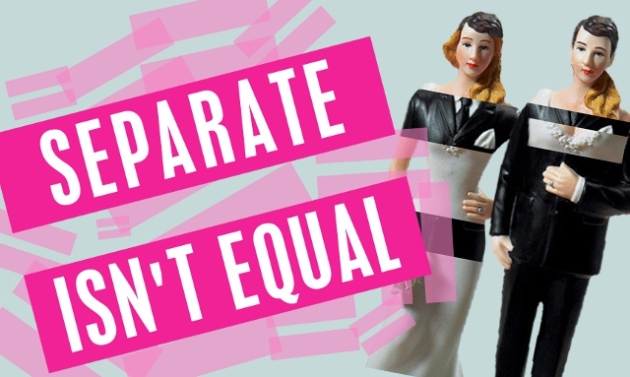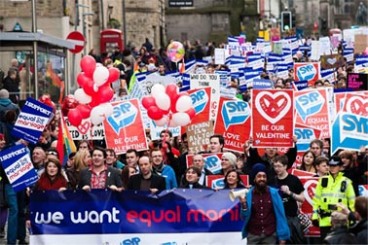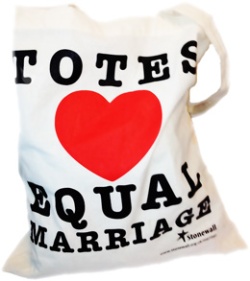Time and again, we are bombarded with news stories of groups denouncing the use of ‘human rights’ to ride roughshod over the Great British (Lack-of) Constitution. Recently, with the mass amount of press generated from the close of the Scottish government’s consultation into equal marriage, the tirade has come from various religious and secular quarters. These groups tend to cite their human rights, as opposed to others’ rights, as ‘more worthwhile’ in the eyes of the law, whether that law is divine or otherwise. Many say they will have their personal and social freedom infringed upon if the definition of marriage is finally amended to make it a truly civil institution signifying an intent to lifelong commitment to one other person.

Marriage, in the Christian sense of the word, means a union in the eyes of God between a man and a woman, signifying their commitment to each other and God, with the intention, God willing, of procreating and spreading God’s love. This, and any other religious interpretation of ‘marriage’ is perfectly acceptable within the bounds of that religious organisation, and should rightly be recognised appropriately by the civil society. However, as we live in a secular state with no state religion or church governance, we have a civil definition of marriage that takes precedence in the laws of that state over any religious ceremony or decree. All church weddings need to be accompanied by a trip to the registry books. Religion alone cannot declare a man and woman married: the law must take ultimate precedence.
Therefore marriage is a civil institution. One that is open to heterosexual couples irregardless of their religion or ethic. If an atheist couple can marry, and have that ceremony carry the same weight of meaning as a Christian marriage, then marriage is done by the law of this country, and any religious affiliation is secondary to the fact. So, why is an atheist couple allowed to marry each other and not a homosexual couple? Does the atheist couple’s obvious infringement of ‘marriage’ as defined by God and the Bible, ie. not planning to join in the eyes of God, not procreate to spread God’s love, indeed, not give two figs about God whoever s/he may be, have much difference to the homosexual couple’s infringement of the ‘true purpose’ of marriage? The answer is no. The only difference is that at least the heterosexual atheist couple are a man and a woman, just like God apparently intended. Hell, these people could be Satanists, and these foamy-mouthed Defenders of Sanctity would be happier than if they were two gay men.

All of the sounding off from Cardinal Wotsit and Bishop of Blah stems directly from one thing: homophobia. This has little to do with human rights or the right to religious freedom. The Scottish government has already made it quite plain that it will not be forcing any religious person or body to take part in gay marriage if they do not want to. Arguing that it will merely lead to the moral implosion of our society into a world of wantonness and sin is laughable at best, obsolete at worst. As far as the teaching of many religions are concerned, we are already well on into our kaliyuga without the help of homosexuals running amok and creating stable family units for themselves.
Ultimately, it all boils down to a single given: we cannot pick and choose our human rights to suit ourselves. One person cannot have one set of human rights and deny another theirs. If each person is to have the right to be an individual in the eyes of the state, then we need to cater to all individuals, and not a mainstream group. Just because one group of people can shout louder than another does not then give them the right to pick and choose where the boundary between human rights and anarchism lies. If we have the right to get married in the eyes of the state, then that right needs to be equal to all. Civil partnerships exist, yes, and do carry the same rights and privileges in law as marriage, however that does not necessarily entail equality in the social sphere. A majority of people do not view a civil partnership as on a par, whether in terms of commitment or seriousness, with marriage. This is entirely to do with the idea that civil partnerships are for one minority group: gay people, whereas marriage is normal. Equal but different doesn’t make any sense. We cannot call these two things equal until they are in the eyes of society, and in order to achieve this we need to alter the law.
Not agreeing with a human right does not make it wrong. Many people and groups over the years have disagreed with human rights the majority take for granted. Free speech in the USSR, health care in the US, religious freedom in France. What suits one set of people and their agenda may not suit another, but in the context of equal marriage, really all that we are doing is finally admitting that marriage is no longer primarily religious in the eyes of society. If religious bodies or others have issue with this, then they need to remove marriage from the state altogether. A democratic country represents all of its people; if marriage is only open to a religious minority then that minority should have absolute freedom to practice it, but out with the terms of civil life as other religious ceremonies are done. A barmitzvah does not signify the beginning of rights and privileges in the eyes of the law. Why should marriage, if it is so purely religious in significance?
The Scottish government has finished their consultation, and have thankfully ruled out a referendum on equal marriage. This is not a constitutional matter effecting the structure of our society or our politics. This is a matter of civil law and what that means in modern society. With reports seeping out the woodwork that Holyrood may instead wait for Westminster’s lead on this, I can only feel incredulous. Another example of pick’n’mix politics: the SNP hate the Westminster Bullies when it suits them to do so, but when courting a little controversy they suddenly defer to the Powers That Be. Scotland has led the UK in a number of social initiatives, whether that be free education for all or free prescriptions. Now is not the time to lay down that liberalism and independent spirit in favour of a few angry cardinals and ignorant, fearful people. If the SNP truly want to lead Scotland into an independent future, then surely now is the time to demonstrate, as the Scottish Executive has done in the past, a little independent thinking.

Total side note: go to Stonewall.org.uk and get your awesome new Totes bag. So tacky, so good.



Equal Marriage: the Human Rights Pick’n’Mix
Time and again, we are bombarded with news stories of groups denouncing the use of ‘human rights’ to ride roughshod over the Great British (Lack-of) Constitution. Recently, with the mass amount of press generated from the close of the Scottish government’s consultation into equal marriage, the tirade has come from various religious and secular quarters. These groups tend to cite their human rights, as opposed to others’ rights, as ‘more worthwhile’ in the eyes of the law, whether that law is divine or otherwise. Many say they will have their personal and social freedom infringed upon if the definition of marriage is finally amended to make it a truly civil institution signifying an intent to lifelong commitment to one other person.
Marriage, in the Christian sense of the word, means a union in the eyes of God between a man and a woman, signifying their commitment to each other and God, with the intention, God willing, of procreating and spreading God’s love. This, and any other religious interpretation of ‘marriage’ is perfectly acceptable within the bounds of that religious organisation, and should rightly be recognised appropriately by the civil society. However, as we live in a secular state with no state religion or church governance, we have a civil definition of marriage that takes precedence in the laws of that state over any religious ceremony or decree. All church weddings need to be accompanied by a trip to the registry books. Religion alone cannot declare a man and woman married: the law must take ultimate precedence.
Therefore marriage is a civil institution. One that is open to heterosexual couples irregardless of their religion or ethic. If an atheist couple can marry, and have that ceremony carry the same weight of meaning as a Christian marriage, then marriage is done by the law of this country, and any religious affiliation is secondary to the fact. So, why is an atheist couple allowed to marry each other and not a homosexual couple? Does the atheist couple’s obvious infringement of ‘marriage’ as defined by God and the Bible, ie. not planning to join in the eyes of God, not procreate to spread God’s love, indeed, not give two figs about God whoever s/he may be, have much difference to the homosexual couple’s infringement of the ‘true purpose’ of marriage? The answer is no. The only difference is that at least the heterosexual atheist couple are a man and a woman, just like God apparently intended. Hell, these people could be Satanists, and these foamy-mouthed Defenders of Sanctity would be happier than if they were two gay men.
All of the sounding off from Cardinal Wotsit and Bishop of Blah stems directly from one thing: homophobia. This has little to do with human rights or the right to religious freedom. The Scottish government has already made it quite plain that it will not be forcing any religious person or body to take part in gay marriage if they do not want to. Arguing that it will merely lead to the moral implosion of our society into a world of wantonness and sin is laughable at best, obsolete at worst. As far as the teaching of many religions are concerned, we are already well on into our kaliyuga without the help of homosexuals running amok and creating stable family units for themselves.
Ultimately, it all boils down to a single given: we cannot pick and choose our human rights to suit ourselves. One person cannot have one set of human rights and deny another theirs. If each person is to have the right to be an individual in the eyes of the state, then we need to cater to all individuals, and not a mainstream group. Just because one group of people can shout louder than another does not then give them the right to pick and choose where the boundary between human rights and anarchism lies. If we have the right to get married in the eyes of the state, then that right needs to be equal to all. Civil partnerships exist, yes, and do carry the same rights and privileges in law as marriage, however that does not necessarily entail equality in the social sphere. A majority of people do not view a civil partnership as on a par, whether in terms of commitment or seriousness, with marriage. This is entirely to do with the idea that civil partnerships are for one minority group: gay people, whereas marriage is normal. Equal but different doesn’t make any sense. We cannot call these two things equal until they are in the eyes of society, and in order to achieve this we need to alter the law.
Not agreeing with a human right does not make it wrong. Many people and groups over the years have disagreed with human rights the majority take for granted. Free speech in the USSR, health care in the US, religious freedom in France. What suits one set of people and their agenda may not suit another, but in the context of equal marriage, really all that we are doing is finally admitting that marriage is no longer primarily religious in the eyes of society. If religious bodies or others have issue with this, then they need to remove marriage from the state altogether. A democratic country represents all of its people; if marriage is only open to a religious minority then that minority should have absolute freedom to practice it, but out with the terms of civil life as other religious ceremonies are done. A barmitzvah does not signify the beginning of rights and privileges in the eyes of the law. Why should marriage, if it is so purely religious in significance?
The Scottish government has finished their consultation, and have thankfully ruled out a referendum on equal marriage. This is not a constitutional matter effecting the structure of our society or our politics. This is a matter of civil law and what that means in modern society. With reports seeping out the woodwork that Holyrood may instead wait for Westminster’s lead on this, I can only feel incredulous. Another example of pick’n’mix politics: the SNP hate the Westminster Bullies when it suits them to do so, but when courting a little controversy they suddenly defer to the Powers That Be. Scotland has led the UK in a number of social initiatives, whether that be free education for all or free prescriptions. Now is not the time to lay down that liberalism and independent spirit in favour of a few angry cardinals and ignorant, fearful people. If the SNP truly want to lead Scotland into an independent future, then surely now is the time to demonstrate, as the Scottish Executive has done in the past, a little independent thinking.
Total side note: go to Stonewall.org.uk and get your awesome new Totes bag. So tacky, so good.
Share this: